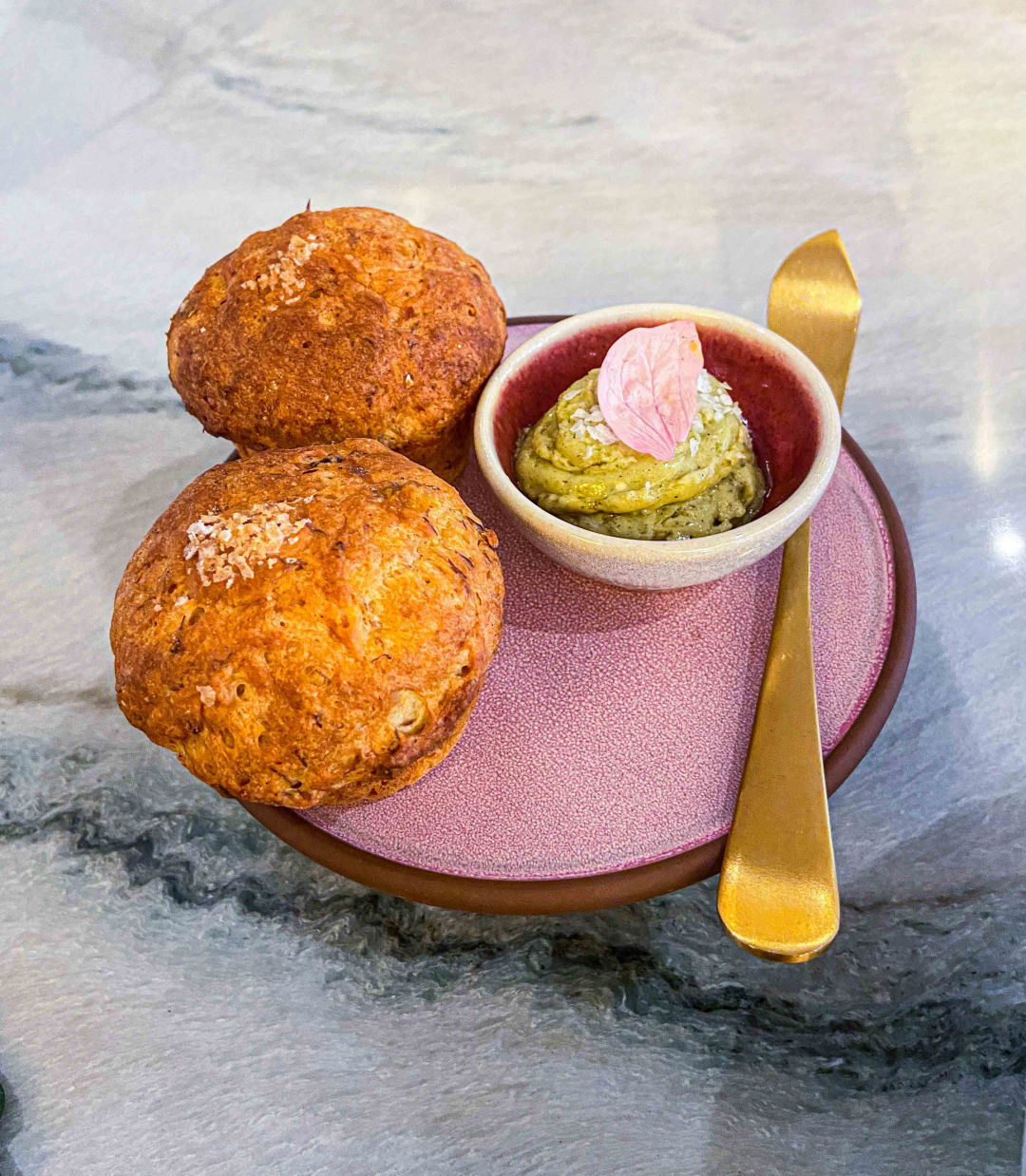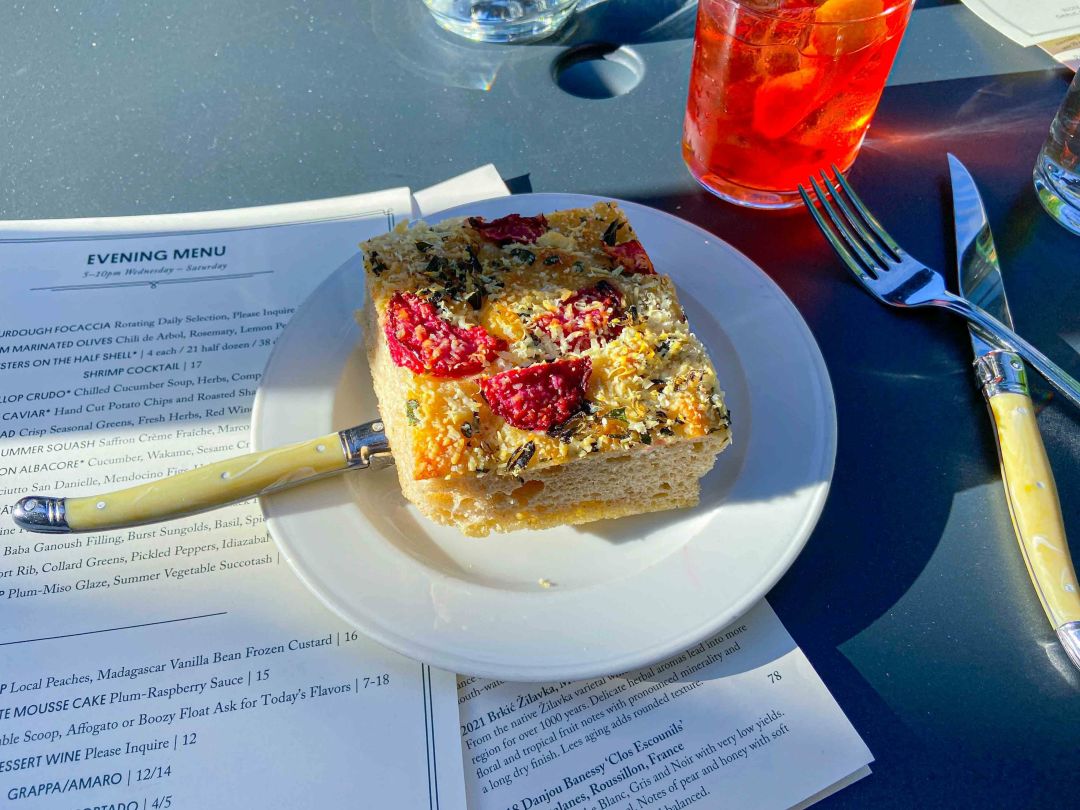
When was the last time you sat down at a restaurant, and a plate of complimentary bread and butter hit the table?
These days, bread is more often a menu item, no longer free. But this isn’t your favorite restaurant nickel-and-diming you, especially as inflation continues to pull at the already-tight purse strings of restaurant economics.
Charging for something that never before recouped any profits creates the opportunity to put bread on a pedestal. When bread isn’t a giveaway, chefs are more apt to give it the same time, attention, and reverence for product quality that has traditionally been reserved for classic appetizers and entrées.
To the trained eye, Café Olli’s menu is clearly based around bread. Whether it’s the breakfast sandwich’s tender milk bun, seed-crusted croutons in the panzanella salad, or the gloriously crunchy baguette for deli sandwiches, bread is everywhere. Given its starring role, it makes sense that bread and butter holds down a spot on the menu. The $4 baguette and butter plate fits in with the other dishes because it is also high-quality, hyper-local ingredients prepared simply and skillfully.
“I think I've gotten a pretty interesting view of it because I worked in bakeries before making the decision to bake in restaurants, which is kind of hard to do—financially, it's tough to justify a baker in a restaurant model,” says Daniel Green, a partner at Café Olli who’s responsible for the restaurant’s bread.
Green says, for some reason, paying for bread “pisses people off.” Diners still aren’t used to paying for bread, he says, and sometimes get upset if they see it on the bill at the end of their dinner: “The expectation has been created; it's years of having to walk it back.”
The flours Green uses at Café Olli are sourced from local mills and are perishable, the same way a head of broccoli and a case of tomatoes have a limited shelf life. Comparing bleached white commercially-processed flour to the grains he sources from mills like Camas Country Mills in Eugene is apples to oranges—except the oranges in this case cost more than double the apples.
Before taking the job as the opening pastry chef of Gregory Gourdet’s brand-new Haitian restaurant Kann, Gabrielle Borlabi baked country loaves and focaccia for the complimentary bread plate at Mucca Osteria downtown. She says the variety of breads she made at Mucca took a lot of effort to put together every day, but she’s been able to put a lot more heart and soul into the gluten- and dairy-free plantain brioche muffins, $10 for two, that serve as the bread course at Kann.
The nontraditional, allergy-friendly brioche muffins are made with coconut milk and a vegan butter substitute, with ripe plantains lending the rich flavor and binding properties usually brought by eggs. “When you’re doing gluten-free and dairy-free baking, you really have to have a little fun, a lot of patience, and just make it work,” says Borlabi.
Gourdet says he envisioned the muffins as “a classic bread course, but our way,” incorporating plantains, a centerpiece of Haitian cuisine, and mixing the herb-y Haitian spice blend epis with the vegan butter that’s served alongside.

Like everyone else, Naomi Pomeroy made sourdough bread at home during lockdown. She got some starter from her friends at Sorbu Paninoteca, the Italian sandwich food cart in Northeast Portland that bakes all of its sourdough focaccia and ciabatta in the cart (just ask any baker how cramped that kitchen must be). Once she caught the bug, baking bread turned into an obsessive pursuit—she calls it “taming the mustang.”
That home project became Ripe’s sourdough focaccia, which started as a vehicle for Pomeroy’s take on a muffuletta, the classic pressed Italian sandwich she opted to serve jam-packed with mortadella—her most-ever liked Instagram post, she says. But now the focaccia is a standalone mainstay on her all-day café’s menu.
Pomeroy’s focaccia is $9 per order, and it’s not a huge portion, which might make some balk, but she says it’s helpful in telling the story of how much food actually costs. The price, she says, lets her top the fluffy, olive oil-rich bread with the ingredients she really wants to cook with, like cave-aged gruyere or black plums fresh from the farmers market.
“When I did the math on how much focaccia we’re selling in a month, I was like, ‘oh, this totally justifies it becoming a big focus.’ And so, over time, it's really evolved and grown,” she says.
Pomeroy points out that many diets have shifted away from bread, due to both carb-conscious diners and the huge spike in awareness surrounding gluten intolerance and allergies. “It’s painful to throw away food,” she says. “Part of it is guarding against that, too. I don’t want to give somebody something that they don’t actually want.”
Bread isn’t the first example of a new cost being added to your tab in recent years, but it is one that speaks to the changing optics surrounding dining out. The trend to strip away some of the superfluous, on-the-house aspects of restaurant meals is slowly working towards a more sustainable dining culture, and helping to shed light on the invisible costs that have long been absorbed by restaurants.
After all, when’s the last time you had an after-dinner mint?
"bread" - Google News
September 14, 2022 at 01:08AM
https://ift.tt/4pbvBIa
Portland Restaurants Are Ditching Free Bread. Here's Why It's Actually a Good Thing. - Portland Monthly
"bread" - Google News
https://ift.tt/oOL6xUD
https://ift.tt/RbTcLhA
Bagikan Berita Ini














0 Response to "Portland Restaurants Are Ditching Free Bread. Here's Why It's Actually a Good Thing. - Portland Monthly"
Post a Comment